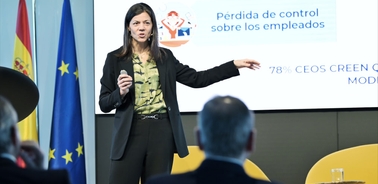25% managers give up telework days over team management challenges: DKV-IE University Chair research

During its first year, the DKV-IE University Chair has investigated the challenges faced by managers working with remote teams and the impact on their mental health.
“Navigating the new normal: telework and challenges for managers”, the first report of the DKV-IE Chair on employee health and well-being was presented today.
Launched in 2023, the Chair, created by DKV and IE University focuses on producing cutting-edge knowledge about the links between organizations and the well-being of their workers, in addition to academic research to contribute to the improvement of health and well-being in organizations’ workforces.
Presenting the report, Javier Cubría, Chairman of DKV’s Executive Committee, said: “While progress in technology and flexibility can improve working conditions, it can also generate anxiety and job insecurity. It is crucial that we do not lose sight of the human aspect in this process of change and that we strive to ensure that progress goes hand in hand with the well-being and approval of workers.”
The study was prepared by Rocío Bonet, director of the Chair and a professor at IE University, along with Marco Minervini, a professor at IE University, and Ignacio Miguel Pardillo, researcher at the Chair.
“What surprised us most about the study is that many of the changes taking place in the current corporate environment, such as flattening of hierarchies towards more agile organizations, high team turnover, or continuous restructuring, seem to present significant challenges for remote management,” said Rocío Bonet, adding: “Our findings on the consequences such challenges have on the health and well-being of managers highlight the relevance of paying attention to managers to ensure the success of the new hybrid work model.”
The pandemic: a turning point
Navigating the new normal: telework and challenges for managers begins its analysis by looking at the impact of the pandemic on the world of work. Covid-19 made teleworking the new normal. After this period, many employees have chosen to continue working remotely. Importantly, teleworking is one of the main demands of staff in today’s work environment.
According to data collected in a global survey on teleworking in 2022, 13% of employees in Spain would consider leaving their jobs if they were asked to return to the office full time. Among the benefits people cite from remote work are higher productivity, due to time savings in commuting, and better work-life balance (Barrero et al. 2023).
However, not all employers consider teleworking to be the best option. Reflecting this reluctance, recent research has found a considerable gap between the number of days employees would like to telework and those allowed by their organizations. In Spain, it is 1.1 days (Aksoy et al., 2023). The study takes this gap as a starting point to explore what may be behind the disconnect between employees and employers by focusing on an underexplored aspect: the use made of telework. After questioning 415 managers of teams in Spain, all with jobs that can be done remotely, the study finds that although managers report wanting to telework more days than they were offered, a significant proportion do not use all the days available to them. This tendency to use fewer days than allowed also appears to be greater for managers than for their subordinates.
Changes in productivity
The study highlights the fact that 25% of managers surveyed regularly give up some telework days offered by their employers, although they would like to have more. This gap between the days offered and those taken, and between those taken and desired suggests that managers give up remote working to improve their performance to compensate for the challenges posed by teleworking.
Similarly, those who forgo teleworking days also have the worst perceptions of changes in productivity, both their own and their online teams’.
Importantly, the decision to forego teleworking days is not due to any personal characteristics of managers, but to attributes of the organizations where they work.
These attributes include expected aspects such as the type of industry, how employee performance is monitored, and technology adoption. For example, the study shows that managers working in hospitality, retail, manufacturing, and industry give up the most teleworking days. In addition, it highlights that giving up teleworking days is higher when managers believe they can better evaluate the effectiveness of their subordinates by observing them directly and when there is less support from technologies to assess their performance.
The study also reveals under-investigated factors: in organizations with more organizational change, a higher degree of conflict and largely horizontal structures, where decisions are generally made between team members and the manager, managers are more likely to forego teleworking days. This suggest that for those tasks that require more coordination and negotiation to achieve consensus, remote management may work less well. The authors also highlight the importance of asking whether the hybrid work model is sufficient to meet the needs of today’s environment, which is subject to frequent change and in which organizations are trying to improve flexibility by becoming flatter.
Well-being and mental health
The report highlights the impact that these conditions have on the health of those involved: it finds that managers who face greater challenges in their remote management are, at the same time, those with worse indicators of well-being and mental health, as well as a stated desire to leave their company.
Finally, the benefits of telework for managers seem to depend not only on the challenges managers face, but also on their social structure. The data shows that a support network and good social and professional relationships are crucial in promoting the well-being and health of the teleworking employee, while they do not play such a relevant role in the non-teleworking employee, perhaps because at a distance there are fewer options to mitigate the effects of poor relationships.
